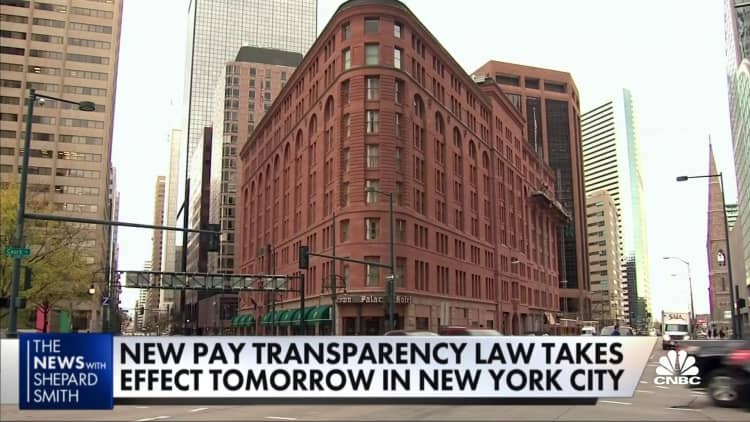New York City businesses and workers are clashing over what's considered an acceptable salary range.
As of Tuesday, employers hiring in NYC must list the minimum and maximum pay range on all of their job ads. The city's salary transparency law states businesses must post a "good faith salary range," defined as one the employer "honestly believes at the time they are listing the job advertisement that they are willing to pay the successful applicant(s)," says the New York City Commission on Human Rights, which enforces the law.
But throughout the week, New Yorkers have called out job postings with ranges of $100,000-plus, throwing into question whether a six-figure salary band counts as a "good faith" range.
Who's responsible for figuring out 'good faith' ranges
While the process of determining and publishing good faith ranges falls on employers, whether it's actually an acceptable one is playing out in the court of public opinion.
The law's chaotic rollout is "ultimately not surprising" to Victoria M. Walker, 29, a freelance travel journalist in NYC who went viral earlier this year for disclosing the salary for a job she left. On Tuesday, she began a Twitter thread of companies' pay ranges on openings, like a $50,000 to $145,000 range on a tech reporter role.
"Companies had ample opportunities before the law went into effect to be transparent about salaries," Walker says. "Now that they're being forced to do it, that some companies would give very broad ranges is completely unsurprising."
"Job seekers need to look at these salaries with broad ranges with an air of skepticism," she adds.
Walker and other proponents of salary transparency say it can be a win-win for workers and businesses alike — candidates save time applying to jobs only that fall within their pay expectations and feel more empowered to negotiate pay later on, while companies save time screening quality candidates who align on their salary budget.
But employers say they're in a tough spot and have little guidance from the NYC Commission on Human Rights, says Domenique Camacho Moran, a New York-based attorney with Farrell Fritz.
Many businesses may post wide ranges in order to show they're open to applicants of varying years of experience, she says. Others, worried about losing out on talent, are widening their pay bands to make sure they can pay competitively in a tight hiring market.

"Better to err on the side of a broad range than create an artificially narrow range," Camacho Moran says.
The two agencies that investigate possible violations of the new law — the City's Commission on Human Rights and the Law Enforcement Bureau — can determine if a wide range has not been made in good faith, says Tony Guadagni, senior principal of research at Gartner.
But it's up to investigators to show a salary range isn't in good faith — not on companies to prove it is.
Others say wide ranges, like those nearing the six-figure mark, will only cause more confusion and friction. "The spirit of the law is to create transparency, and any company having large salary ranges like that doesn't create any transparency," says Beverly Neufeld, president of PowHer New York and a proponent of new law.
Walker agrees and hopes companies will become more specific with their "good faith" ranges in time: "Hopefully we'll stop seeing astronomical salary ranges and companies will tell people what they can expect in the role. A $50,000 to $140,000 range isn't telling me much. I would say it's more confusing."
Public scrutiny could also play a role as workers "question and challenge companies that aren't engaging," she adds.
Employers can still pay above or below what's listed
While employers must list salary ranges for every job posting, it's still possible they could end up paying the final candidate above or below what they advertised.
"The law does not say anything that would prohibit the employer from, at some point in the process, concluding they need to change the compensation," Camacho Moran says. "If in fact, along the way, there's a legitimate, non-discriminatory business reason to change the pay, the employer is free to do that under the law."
For example, the business could realize the scope of the job falls into a lower-level and lower-paying range. On the flip side, a standout candidate could negotiate or be offered a starting salary above what was previously listed.
But employers should make sure any such instances are an outlier and not part of a pattern.
"Every employer should remember that, while that can happen once or twice, if that happens every time and there's an audit or investigation, the argument will be there was not good faith in the creation of the range," Camacho Moran says.
Businesses found to be in violation of the salary range law could be fined up to $250,000 or taken to court.
Want to earn more and work less? Register for the free CNBC Make It: Your Money virtual event on Dec. 13 at 12 p.m. ET to learn from money masters like Kevin O'Leary how you can increase your earning power.
Check out:
$2 million ranges, deleted job posts: NYC's salary transparency law is off to a rocky start
'The more transparency, the better': How NYC job seekers say visible pay ranges will help them
Salary ranges are coming to NYC job ads on Nov. 1—here's what to know



